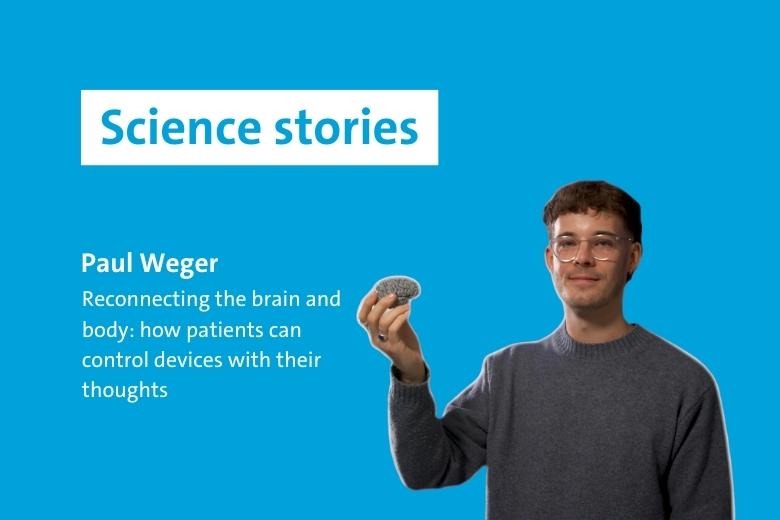Why identity safety in health professions education matters
At the Faculty of Health, Medicine and Life Sciences, staff and students strive to make a difference. For instance, Emma focuses on health beyond medical research, and Ellen studies managing waiting times in healthcare. In 'Nice to meet you' these individuals introduce themselves and share their work within FHML.
Feeling like you do not belong in your education can not only affect your well-being, but also influence how much information you remember and how well you perform in exams. Eventually, it could lead to students dropping out. This is troublesome, especially in health professions education, because of the big shortage of healthcare workers. Therefore, Shika Pai wants to help students with this. She is a first-year PhD candidate at the School of Health Professions Education (SHE) and conducts research on identity safety in health professions education, with a focus on medical education.
Shika is from India, where she did a bachelor’s in psychology. After that, she went to Vrije Universiteit Amsterdam to pursue a master’s in social psychology. “Doing all the research was very exciting, but I also wanted a practical application,” she says. “This PhD position opened up at SHE and it looked like an interesting way to apply my knowledge to the field of medical education.”
One-size-fits-all
Her PhD focuses on identity safety, which is the freedom to be yourself and to express yourself authentically without fear of judgement. “This is a relatively new concept,” Shika explains. “We are mostly trying to understand what it means to different people, and we would like to recognise that everybody is different. Instead of a one-size-fits-all approach which tries to create equality by doing the same thing for everybody, it may be more useful to pay attention to each student’s needs and see how we can fit that into our education methods.”
Dropping out
Why is it important to consider identity safety in education? “Research shows that some students do not see people like themselves in the field and feel like they do not belong in their education,” Shika says. “This has a lot of impact on the way we learn. It can affect your well-being, and influence how much information we remember and how well we perform in exams. Furthermore, it can lead to students dropping out and not pursuing the profession. This is troublesome, because there is a big shortage of healthcare workers.”
Students who do not feel like they belong can also start changing parts of themselves to fit into the norm, or what they think is the norm. “This impacts the diversity of the workforce,” Shika says. “We would like to see people with many different identities and backgrounds there, because it has implications on, amongst others, how they treat patients and what research focuses on. For example, historically, there has been less research focused on women’s health, which has been linked to an underrepresentation of women in the field. The same applies for instance to the experiences and health needs of racial groups or trans people.”
I think it is important to include both students and teachers, because they both play a role in creating the learning environment.
Students and teachers
In total, Shika will be doing four studies. “The first two will focus on medical students, probably bachelor students in the international track of medicine in Maastricht,” she explains. “In the other two studies, we would like to look at educators to see how they experience and approach identity safety in their students, and what challenges they face. I think it is important to include both students and teachers, because they both play a role in creating the learning environment. By looking at the students’ and the teachers’ needs, the faculty can support both at the same time.”
Diversity
What does Shika hope to achieve with her research? “I would like to raise awareness about differences in people and expand the definition of inclusion,” she says. “We have different measures to make sure the student body is diverse. However, I think we can put a lot more effort into understanding what happens to students in education, because we still see a lot of them dropping out. It would be nice to understand the barriers they face once they are in the educational program and how we can overcome them. Within education, I would like to build a basis for strategies to help students become safer and feel stronger in their identities, and not feel like they have to leave parts of themselves behind. I think it is important to retain diversity in all work fields and I would like to contribute to that in some way. It is very ambitious, but what I like about research is that it takes a step towards building that knowledge base.”
Text: Joëlle van Wissen
Also read
-
Reconnecting the brain and body: how to control devices with your thoughts
Can you control a robotic arm with your thoughts? Paul Weger (MHeNs) studies this to give back independence to patients with neurological conditions.
-
Green school playgrounds boost concentration and wellbeing
Children at schools with green playgrounds are better able to concentrate and display more social behaviour. This is the conclusion of a follow-up study within the long-running project The Healthy Primary School of the Future .
-
Ron Heeren appointed fellow of the Netherlands Academy of Engineering
Professor Ron Heeren, distinguished university professor at Maastricht University (UM) and director of the Maastricht MultiModal Molecular Imaging Institute (M4i), was appointed as a fellow of the Netherlands Academy of Engineering (NAE) on Thursday 11 December.